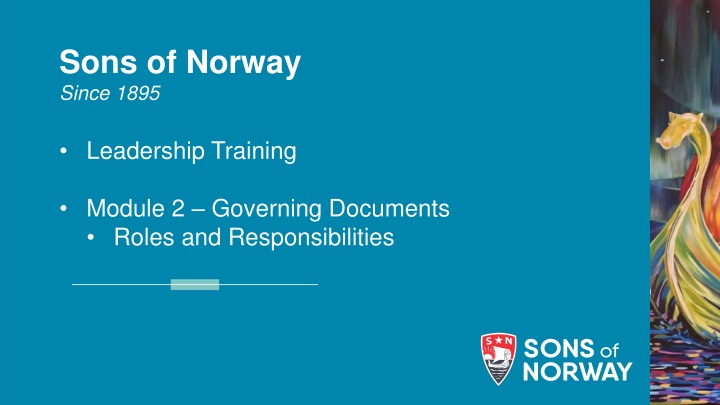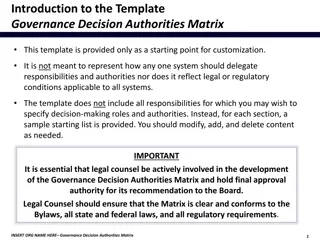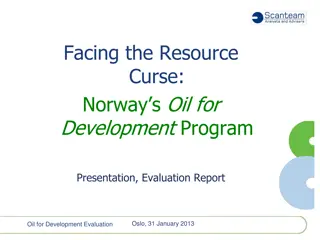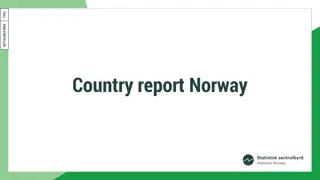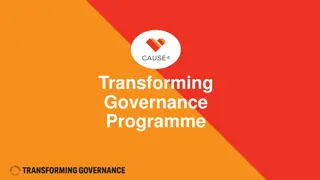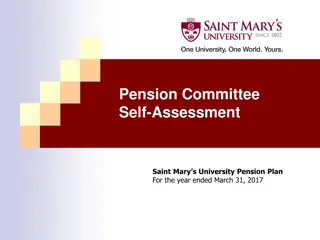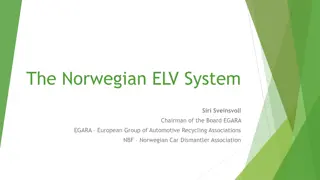Sons of Norway Leadership Training: Governance and Responsibilities
Sons of Norway, a fraternal benefit society since 1895, operates under IRC 501(c)(8) and 501(c)(2). This module covers governing documents, roles, and responsibilities within the organization, emphasizing the importance of fraternal purpose, the lodge system, and property management. It delves into the structure of local lodges, district and international governance, and the role of volunteer leadership in upholding the organization's mission of promoting Norwegian heritage. The distinction between fraternal and non-fraternal activities is highlighted to maintain tax-exempt status.
Download Presentation

Please find below an Image/Link to download the presentation.
The content on the website is provided AS IS for your information and personal use only. It may not be sold, licensed, or shared on other websites without obtaining consent from the author.If you encounter any issues during the download, it is possible that the publisher has removed the file from their server.
You are allowed to download the files provided on this website for personal or commercial use, subject to the condition that they are used lawfully. All files are the property of their respective owners.
The content on the website is provided AS IS for your information and personal use only. It may not be sold, licensed, or shared on other websites without obtaining consent from the author.
E N D
Presentation Transcript
Sons of Norway Since 1895 Leadership Training Module 2 Governing Documents Roles and Responsibilities
Module Objectives Why we do what we do? IRC 501(c)(8) IRC 501(c)(2) property IRC 501(c)(3) Charter, Constitution Polices and Procedures District by-laws Local Lodge by-laws How does it all get done? Home Office paid staff Volunteer leadership
501(c)(8) - Sons of Norway- Fraternal Benefit Society As a fraternal benefit society, Sons of Norway is exempt under Section 501(c)(8) of the Internal Revenue Code, which relates specifically to fraternal benefit societies. To qualify as an exempt fraternal benefit society, an organization must meet the following requirements: Must have a fraternal purpose; Must operate under the lodge system; and Must provide for the payment of life, sick, accident, or other benefits. "Fraternal" means a common tie or goal, such as the Sons of Norway goal of promoting and preserving the heritage and culture of Norway. In order to maintain an exempt status as a fraternal benefit society, a society may not engage in unlimited non-fraternal activities or provide unlimited non-fraternal benefits.
501(c)(8) - continued An organization is operating under a "lodge system" if it is carrying out its activities under a form of organization that comprises of local branches called lodges or chapters. The local lodges must be chartered by a parent organization and be largely self-governing. The term "operating under the lodge system" implies at a minimum, two active entities, a parent organization and a subordinate. In the case of Sons of Norway, the organization is governed by the International Lodge, and through the International Officers and International Board of Directors. Contributions for fraternal or social purpose are not tax deductible. Donations are deductible if made to a segregated scholarship fund.
501(c)(2) Title Holding Corporation for Real Property A 50l(c)(2) organization, also referred to as a "Title Holding Corporation" is one that is formed for the exclusive purpose of holding title to property, collecting income related to the property, and turning over the income, less expenses, to a parent organization (the Lodge) . Title Holding Corporations are generally created to limit the parent organization's liability from real property ownership, clarify title to property, simplify accounting, and comply with state law requirements. The Sons of Norway bylaws provide that when a Lodge desires to acquire real property, it shall organize a separate non-profit Title Holding Corporation to take title to the real estate. Holding title to property through the Title Holding Corporation can limit the liability of the Lodge. The 501(c)(2) status allows the corporation to be recognized as a non-profit for federal lax purposes. Donations to an exempt title holding company are not tax deductible.
501(c)(3) SofN Foundation; Charitable Trust A 50l(c)(3) organization is the most common type of tax-exempt nonprofit organization. An approved 50l(c)(3) exemption allows donors to reduce their own taxable incomes by deducting the amounts of their donations given. The 50I(c)(3) exemption allows the organization to avoid federal income taxes on the difference between revenues (donations, grants, service fees) received vs. expenses(wages, supplies, state and local taxes paid, etc.) . The organization is exempt from federal income taxes if its activities of the organization consist of such activities as the following: charitable, religious, educational, etc. The majority of 50I(c)(3) organizations, are eligible to receive tax-deductible contributions. In the case of the Sons of Norway Foundation, the organization is governed by the Foundation Board of Governors.
Charter, Constitution, Policies and Procedures The Sons of Norway is governed by its Charter, Constitution, Policies and Procedures which can be found on the SofN website.
District Lodge The District Policies and Procedures are being updated and must be approved by the District Board. Anticipated to be completed Spring 2020. The District by-laws are undergoing a critical review to update. Any substantive changes must be approved at the 2020 District Convention.
How does it all get done? Sons of Norway Headquarters Staff: Accounting Actuarial Executive Fraternal / Marketing Human Resources Information Services Sales Insurance Professionals Most lodges in the USA are assigned an Insurance Professional who provides information, guidance and purchasing opportunities for Sons of Norway Financial Products. The lodge Insurance Professionals are listed on the lodge director on www.sonsofnorway.com. Lodges can also contact the Sales Department at Sons of Norway Headquarters for more information. Volunteer Leadership Sons of Norway International, District and Lodge Officers are all dedicated volunteers. Some officers do receive a small stipend for their service.
Shared Values A Simple Promise
